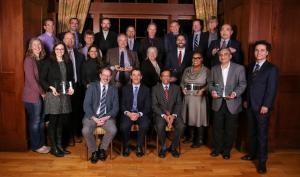Madhav Marathe

About
Madhav Marathe is an endowed Distinguished Professor in Biocomplexity, Executive Director of the Biocomplexity Institute, and a tenured Professor of Computer Science at the University of Virginia. Dr. Marathe is a passionate advocate and practitioner of transdisciplinary team science. During his 30-year professional career, he has established and led a number of large transdisciplinary projects and groups. His areas of expertise include digital twins, network science, artificial intelligence, high-performance computing, computational epidemiology, biological and socially coupled systems, and data analytics.
His prior positions include Director of the Network Systems Science and Advanced Computing Division at the Institute (UVA), Professor of Computer Science and Director of the Network Dynamics and Simulation Science Laboratory within the Biocomplexity Institute of Virginia Tech and a team leader of research and computing in the Basic and Applied Simulation Science Group, Computer and Computational Sciences Division at the Los Alamos National Laboratory. He is a Member of the Virginia Academy of Science, Engineering, and Medicine (VASEM) and a Fellow of the American Association for the Advancement of Science (AAAS), Society for Industrial and Applied Mathematics (SIAM), Association for Computing Machinery (ACM), and Institute of Electrical and Electronics Engineers (IEEE). Dr. Marathe has published more than 500 articles in refereed journals, conferences and workshops, book chapters, magazine articles, refereed posters and papers based on abstracts, issued patents, and case study technical reports. Mentoring and training next-generation scientists have been his life-long passion. He has mentored more than a dozen staff scientists, and advised or co-advised 30+ doctoral students, 20+ MS students, and 15 postdoctoral fellows.
Dr. Marathe and his team focus on developing the scientific foundations and associated engineering principles to study large-scale biological, information, social, and technical (BIST) systems. His current interests span five broad themes: (i) methods to construct various BIST networks using partial and noisy data as well as procedural information; (ii) understanding the general form and structure of dynamical processes over BIST networks (e.g., key network/pathway properties and typical pathways that impact dynamics); (iii) algorithmic theory of optimization and control as it pertains to dynamical processes, including methods to detect, enhance, arrest, and mitigate dynamics; (iv) general conceptual and algorithmic foundations to understand the co-evolution of networks and dynamics; and (v) high-performance services-based computing solutions that can be delivered seamlessly to end-users and policymakers.
Education
BTech. Computer Science and Engineering, IIT Chennai, 1989
Ph.D. Computer Science, University at Albany-SUNY, 1994
Our research focus is to understand general principles that govern the design, analysis, control, and optimization of complex networks. We take a team science approach and develop innovative solutions that have societal impact.
Research Interests
Selected Publications
MEYUR R, VULLIKANTI A, SWARUP S, MORTVEIT H, CENTENO V, PHADKE A, POOR HV, MARATHE M
